The Data on Race Are Clear
Gregory Hood, American Renaissance, May 27, 2019
The Pew Research Center’s “Race in America 2019” report shows America’s racial situation is untenable. Most whites think the country’s gone “far enough in giving blacks equal rights.” Most blacks think it hasn’t; half doubt it ever will. Whites have almost no racial consciousness while race is central to the identity of most non-whites. Embittered non-whites will continue to make demands on whites who believe they’ve given enough. There will be conflict.
The races disagree on whether the country has given blacks equal rights. Overall, a slim majority of Americans think things are “about right” or have “gone too far.” Yet almost 80 percent of blacks, and a plurality of Hispanics, thinks America hasn’t gone far enough.

Most whites don’t want any more civil rights concessions, but they don’t feel oppressed. For white advocates, the Pew data reflect a bizarre view. Most whites believe being white helps them “get ahead” and even greater percentages of non-whites believe whites have an advantage. (At least that’s what they say.)

Most blacks think being black hurts them.

Blacks with at least some college are more likely to believe this. Thus, more educated blacks means more disaffection.
Most blacks believe they are treated less fairly in the criminal justice system, in stores, when voting, and even when they need medical treatment.
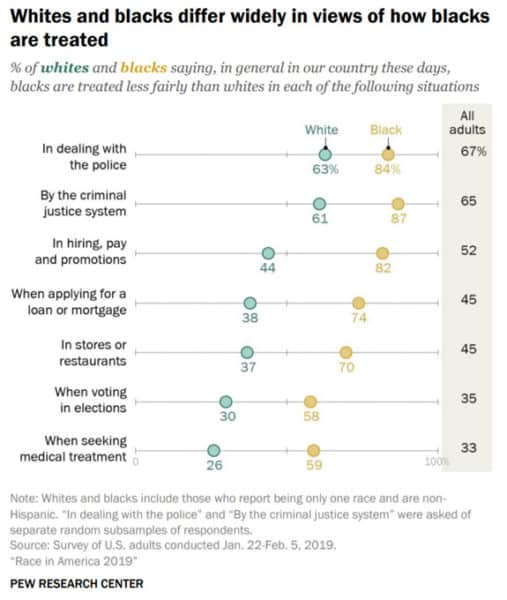
Most non-whites say they have faced discrimination, while two-thirds of whites say they never have.
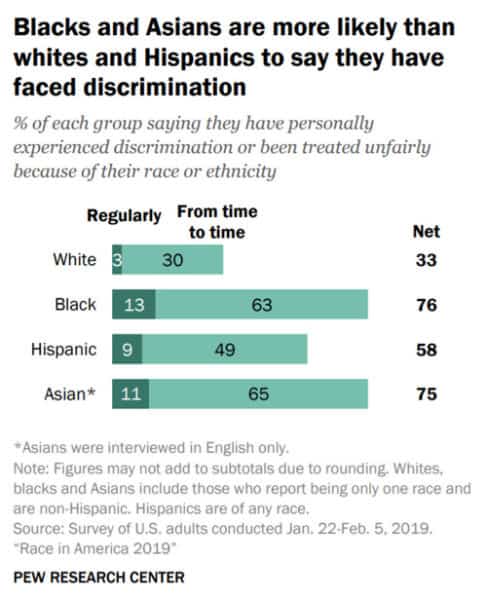
Interestingly, Asians are more likely to report personally suffering discrimination than Hispanics. Asians also report being mocked or slurred more often than any other group. But who is mocking and slurring them? Whites? Blacks?
Just 37 percent of whites say they’ve been slurred or mocked, though the mainstream media regularly insults whites collectively. Conservatives and white advocates are deplatformed, smeared, threatened, and physically attacked. However, 45 percent of Americans, including most blacks, think expressing “racist views has grown more acceptable.” Race realists often conceal their views, yet 65 percent of Americans claim it’s become more common for “people to express racist or racially insensitive views” since President Trump’s election. Clearly they believe what they have been told.
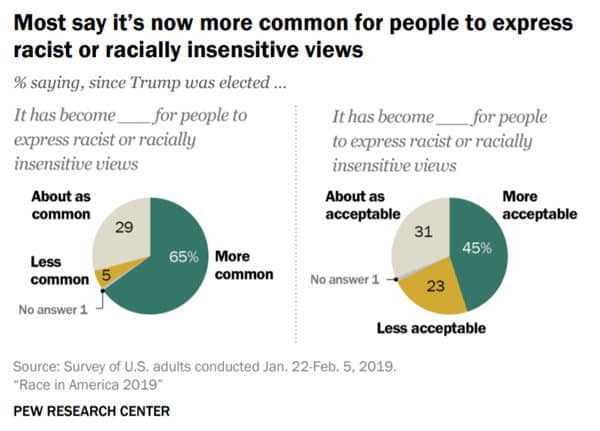
Why don’t whites notice the hostility against them? Most don’t consider race “very” or “extremely” significant to their identity. Yet majorities of other races do, including 74 percent of blacks.
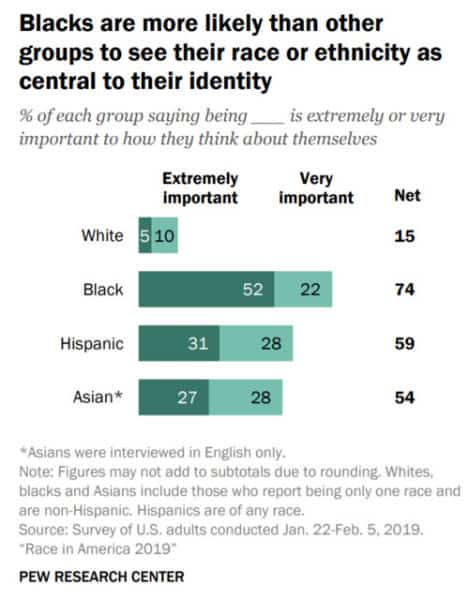
Most Americans believe different groups “get along,” but the percentages differ by group. Almost all whites and Asians believe they get along with each other (92 percent of whites and 84 percent of Asians), but just 58 percent of whites and a minority of blacks believe whites and blacks get along.
Whites are more optimistic (or naive) about race relations. They consistently overestimate how well they get along with people of different races. Interestingly, blacks do the same.
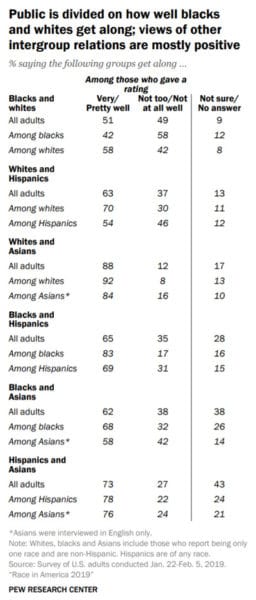
Surprisingly, though they were more likely to experience segregation, older blacks are more optimistic about black-white relations than blacks under 50. Just 33 percent of younger blacks say blacks and whites get along with each other. [pp. 21-22]
Small minorities of all Americans think “all or most” members of other groups are racist against either blacks or whites.
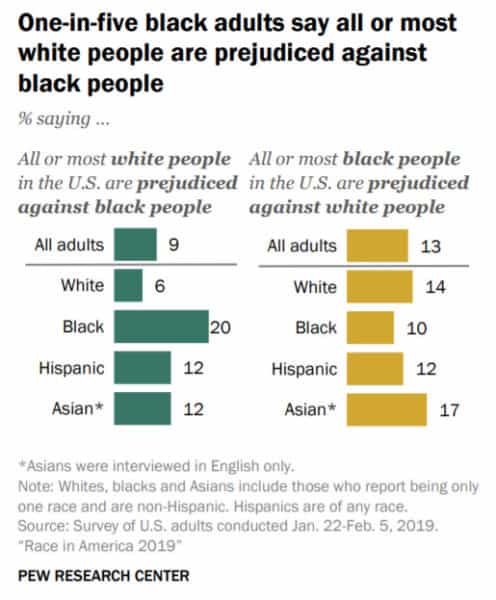
Interestingly, more Americans think that the majority of blacks are prejudiced against whites than the reverse, and Asians are slightly more likely than whites to think blacks are racist towards whites.
Most Americans — 53 percent — say race relations are getting worse. Thirty percent say they’re staying the same and 17 percent say they’re getting better. Many blame the President. President Trump fusses over minorities and ignores whites. His prison reform will disproportionately benefit blacks and Hispanics. Yet large majorities of non-whites say President Trump made race relations worse. Just 13 percent of Americans say he even tried to improve them. The mainstream media, which despise the President, highlighted this part of the report.

Most whites (59 percent) think the best way to improve race relations is to focus on what groups have in common. Non-whites, particularly blacks and Asians, want to focus on differences.

Whites generally think too much attention is paid to race while most non-whites — especially blacks — want more attention paid to it.

Whites want to transcend race; others do not.
Not surprisingly, college increases “racism” awareness.
- Eighty-seven percent of blacks with college degrees say the country hasn’t given blacks equal rights; 75 percent of blacks with no college agree. [36]
- Ninety percent of blacks with at least some college say the legacy of slavery has a sizable impact on blacks today, compared to 76 percent of less educated blacks. [38]
- Eighty-one percent of black college graduates say “race hurts blacks’ ability to get ahead;” 57 percent of those with no college agree. [30]
- Fifty-three percent of whites with a bachelor’s degree think blacks “are treated less fairly when applying for a loan or mortgage.” Only 26 percent with no college agree. [34]
Like other studies, the Pew report finds younger whites are more liberal. Most younger whites (18-29 year-olds) believe that country hasn’t gone far enough in granting “equal rights.” [36] Young whites are less likely than their elders to value racial identity. [44] Fifty-four percent of younger whites also believe it’s better to focus on groups’ unique qualities rather than what groups have in common. [23]
The report bodes ill for the future. Despite privileges, most blacks don’t think they have “equal rights,” and half think they never will. They cannot be satisfied. Even reparations would only prompt additional demands.
Race denialism creates this problem. If racial realities can’t be discussed, “racism” is the sole explanation for inequality. Combatting it requires expansive programs and social engineering. When these fail, the only conclusion is that racism is more insidious, suble, and widespread than anyone thought. The result is resentment against whites, and the Pew report duly shows minorities feel oppressed.
There is a major split between white Democrats and white Republicans. “[A]fter controlling for other factors, partisanship has a greater association with views about the country’s racial progress than demographic factors,” says the report. [8] Nicholas Valentino and Kirill Zhirkov similarly found “racial and partisan schemas” increasingly overlap. According to analysts such as Sean McElwee, white liberals have actually moved further left on racial matters than non-whites. The Pew data partially supports this; more white Democrats (86 percent) than black Democrats (79 percent) blame President Trump for making race relations worse. [7]
Republicans disagree. Only 20 percent think Mr. Trump made race relations worse; a plurality of 34 percent say he’s improved them, 25 percent say he tried but failed, and 19 percent say he didn’t address the issue. More than half of Republicans think President Obama made race relations worse. [7]
The divisions between white Democrats and Republicans (with “leaning towards” included in these partisan categories) are staggering.
White Democrats and white Republicans have almost mirror-image opinions about whether racial discrimination is over or under-reported. As in the Covington Catholic incident, liberals and conservatives see the same situation fundamentally differently. [8]
White Republicans and Democrats also disagree on whether being white is an advantage. Just 38 percent of white Republicans believe their race is an advantage, while 80 percent of Democrats do. A sizeable minority of 22 percent of whites believes their race hurts their ability to “get ahead”; a tiny three percent of white Democrats agree. [29]
Democrats tend to blame racial discrimination or bad schools and low-paying jobs for black failure. One third or fewer white Republicans believe this, instead blaming “family instability, lack of good role models and a lack of motivation to work hard.” [10] Pew did not give respondents the option of saying racial differences in intelligence hold blacks back. The responses would have been interesting.
“White nationalism” is not, as one excitable journalist claimed, the “GOP’s meal ticket.” Republicans are just more skeptical about black claims of discrimination. The GOP mostly represents whites who want to treat people equally and ignore race. Republicans prefer to focus on individual responsibility, not race. Unsympathetic journalists and academics call this “white fragility;” I’d call it self-defense in a country where one wrong word about race can ruin your life.
The Pew Report is mostly bad news. Non-whites’ claims of oppression often bring more privileges. Blacks, Hispanics, and Asians have powerful incentives to claim they’re victims; many have convinced themselves it’s true. White egalitarians, especially journalists, academics, and social workers also benefit from perpetuating these ideas. Why stop?
Most whites, especially white Republicans, don’t want more egalitarian experiments, but if they don’t organize, that is exactly what they will get.
In the end, the racial extremism of white and minority Democrats may be self-defeating. Their program depends on constant racial agitation and an ever-expanding definition of racism. Unending jabber about race and white guilt may force racial consciousness on whites. Sanity lies in organizing the 15 percent of whites who already have a strong sense of racial identity and instilling that identity into many more. That, of course, is our job.















